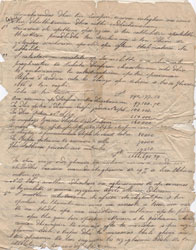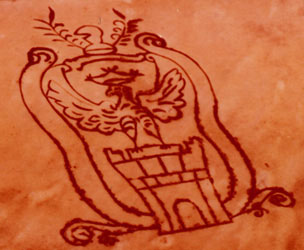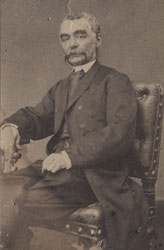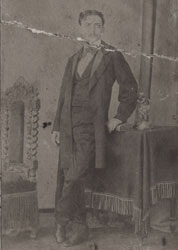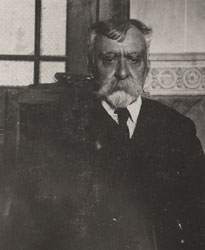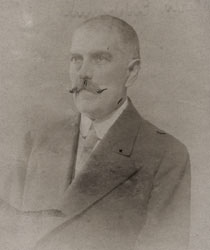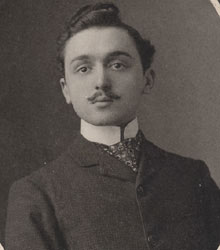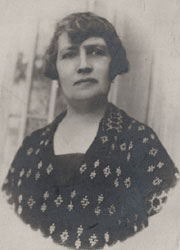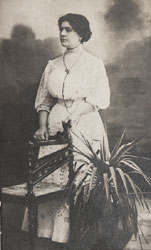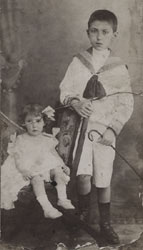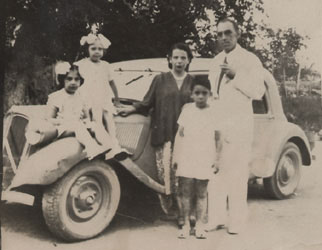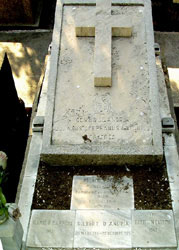I live in Atlanta, Georgia, USA, however my childhood passed in Izmir, Turkey, and I have fond memories of the place, a land where 5 generations of my family were born and raised.
The d’Andria family goes back to Chios, and before that to Italy, part of the medieval migration of seafaring merchant people. Im a descendant of Pantaleone d’Andria, a Genoan merchant established in Chios in 1565. They are 11 generations between Pantaleone me, (Pantaleone > Gasparo (d. 1623) > Michele > Paschal (b. 1663) > Giuseppe (b. 1695) > Antonio (d. 1789) > Giovanni Antonio (b. 1741) > Giuseppe (b. 1782) > Stephano (1815-1875) > Paul Leopold (1866-1915) > Gilbert (1901-1970) > Bernard (b. 1940) > >), details here: The big part of the d’Andria family left the island after the massacres of Chios in 1822.
I have a copy of the Will of Stefano d’Andria (kindly transcribed by the researcher Marie-Carmen Smyrnelis and translated in to French - English version courtesy of Sabine de Andria), my great-grandfather dated Symrna 12 June 1867, written in Francochiotika - Greek written in Latin characters, very much used by the Levantines during the XIXth century. This includes much interesting detail of their holdings at the time. This little studied hybrid language has its own peculiarities and some words are practically untranslatable. Certain elements of this translation deserve to be underlined: The properties are put in the name of the wife, a practical custom amongst Levantines who were lately authorized to have real estate under Ottoman law. The presence among the trustworthy persons, on the same level as the brothers of Stefano, of Etienne Alexandre de Andria, one of sons of my great-great-grand-father Joseph Marius. This presence seems to confirm a strong proximity between Stefano and our branch. Unfortunately, the most important sum (the first line) could not be identified. So does it act as the treasury? That appears very considerable compared to the value of the land goods.
My father Gilbert d’Andria was a prolific writer, both factual and fiction, and also a poet and all his works were in French. I am indebted to my friend and cousin Jean-François d’Andria, for having done serious amount of research on these hand-written and never published documents, and in time I plan to publish these in their entirety for the purpose of posterity. I include here segments of those I consider most significant, and they cover subjects such as the ‘Incendie de Smyrne’ [Fire of Smyrna], ‘Éducation et scrupules religieux’ [Religious education and religious scruples], ‘Gilbert potache’ [Gilbert the schoolkid], ‘Notes de Gilbert’ [Notes of Gilbert] (slightly reduced), ‘Les amours de Gilbert’ [The loves of Gilbert] and others. Many of these writing are remarkably detailed observations and notes of my father covering his childhood and later life, allowing me to piece together his and his parent’s and relations’ life in Smyrna and Patras, to where like many other Italians living in Turkey at the time of the Turco-Italian, they were made to leave by the authorities.
The d’Andria family goes back to Chios, and before that to Italy, part of the medieval migration of seafaring merchant people. Im a descendant of Pantaleone d’Andria, a Genoan merchant established in Chios in 1565. They are 11 generations between Pantaleone me, (Pantaleone > Gasparo (d. 1623) > Michele > Paschal (b. 1663) > Giuseppe (b. 1695) > Antonio (d. 1789) > Giovanni Antonio (b. 1741) > Giuseppe (b. 1782) > Stephano (1815-1875) > Paul Leopold (1866-1915) > Gilbert (1901-1970) > Bernard (b. 1940) > >), details here: The big part of the d’Andria family left the island after the massacres of Chios in 1822.
I have a copy of the Will of Stefano d’Andria (kindly transcribed by the researcher Marie-Carmen Smyrnelis and translated in to French - English version courtesy of Sabine de Andria), my great-grandfather dated Symrna 12 June 1867, written in Francochiotika - Greek written in Latin characters, very much used by the Levantines during the XIXth century. This includes much interesting detail of their holdings at the time. This little studied hybrid language has its own peculiarities and some words are practically untranslatable. Certain elements of this translation deserve to be underlined: The properties are put in the name of the wife, a practical custom amongst Levantines who were lately authorized to have real estate under Ottoman law. The presence among the trustworthy persons, on the same level as the brothers of Stefano, of Etienne Alexandre de Andria, one of sons of my great-great-grand-father Joseph Marius. This presence seems to confirm a strong proximity between Stefano and our branch. Unfortunately, the most important sum (the first line) could not be identified. So does it act as the treasury? That appears very considerable compared to the value of the land goods.
My father Gilbert d’Andria was a prolific writer, both factual and fiction, and also a poet and all his works were in French. I am indebted to my friend and cousin Jean-François d’Andria, for having done serious amount of research on these hand-written and never published documents, and in time I plan to publish these in their entirety for the purpose of posterity. I include here segments of those I consider most significant, and they cover subjects such as the ‘Incendie de Smyrne’ [Fire of Smyrna], ‘Éducation et scrupules religieux’ [Religious education and religious scruples], ‘Gilbert potache’ [Gilbert the schoolkid], ‘Notes de Gilbert’ [Notes of Gilbert] (slightly reduced), ‘Les amours de Gilbert’ [The loves of Gilbert] and others. Many of these writing are remarkably detailed observations and notes of my father covering his childhood and later life, allowing me to piece together his and his parent’s and relations’ life in Smyrna and Patras, to where like many other Italians living in Turkey at the time of the Turco-Italian, they were made to leave by the authorities.
|
|
|
|
|
|
|
|
|
|
|
|
Text of Mr d’Andria’s presentation on the occasion of 4th LHF-Istanbul Conference, ‘Levantine lifestyle on the Princes’ Islands’, 21 September 2019

